US #BlackHistoryMonth 2021 #ThisIsWhatACoderLooksLike
ACM is celebrating Black History Month in the US this year by posting responses from Black ACM Fellows, volunteers and members to questions about their careers in computing. We'll learn about what inspired them to pursue careers in this field, how underrepresentation shapes the experiences of Black students and professionals in computing, and what can be done to combat racial bias in computing and technology. Here are their responses.
Dorian Arnold
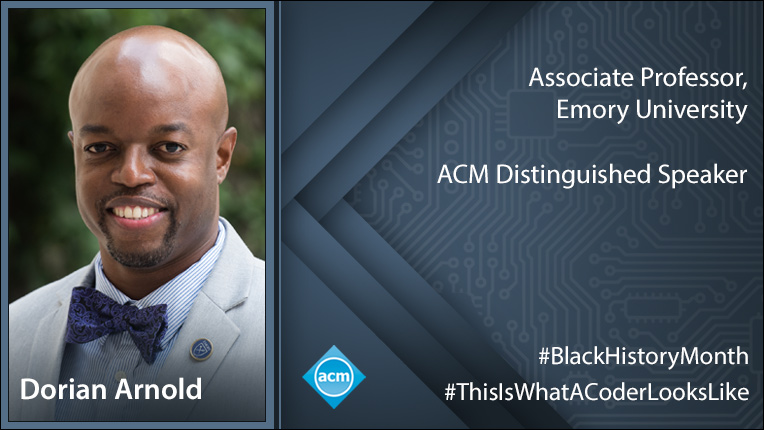
Q: What inspired you to pursue computing as a profession?
A: Without daring to project myself as an "outlier," my story is one of serendipity a la Malcolm Gladwell's famous book of the same name: the fortunate convergence of experiences, environment and opportunity. I took my first computer science class because a friend and upperclassman (from the same country, attending the same college having earned the same math merit scholarship) said "it was cool" and that I should consider CS as a major. This was leading into my third year of college. Turns out, it was cool! I ended up picking it as my second major, then pursuing a graduate degree in the subject.
Q: Were there any Black computing leaders who inspired you early on in your life or career?
A: Unfortunately, 20+ years ago the few Black computing leaders and pioneers, like Annie Easley, Mark Dean, Skip Ellis and others, were unknown to me (and likely to most). Since then, I have had the great fortune to have many of the current generation of pioneers as colleagues, mentors and even friends: Roscoe Giles, Bryant York, Valerie Taylor, Brian Blake, Ayanna Howard, Juan Gilbert, Charles Isbell and many others. Hopefully, this is a signal that now it is somewhat easier for young African Americans to see and learn about computing role models that look like them—not just the aspirational figures that help them shoot for the stars, but the teachers, professors, research advisers and professional mentors in their local environments.
Q: What advice would you give to Black students entering the computing profession?
A: Knowledge is power. And information is knowledge! Identify allies, mentors, supporters and confidantes, recognizing that these people may or may not “look like you.” What matters most is that you trust the people in your corner to have your back as well as to have the professional credibility to lend constructive perspectives. And then leverage this powerful information source to shed light on the things you have experienced and are currently going through and to inform your decision processes to help get you to the places you aspire to be.
Q: How would you suggest organizations foster an environment where young people from all backgrounds know their ideas and contributions are valued?
A: Organizations often maintain a myopic focus on the technical research, education or business agenda—even when discussing “inclusive environments,” “inclusive education,” “inclusive classrooms,” etc., the focus generally remains technical. To truly include and welcome people in a way that makes them feel at home and comfortable in their educational or professional lives, organizations should establish forums that allow young people from all backgrounds to share who they are and engender cultures that embrace everyone in their entirety. If I feel truly embraced by the people in my environment, I will trust that they value who I am and, therefore, the ideas and perspectives I bring to the table. This also fosters an empathy that can help us better understand and appreciate each other for our similarities but especially for our uniqueness.
Q: Where would you like to see improvements within the computing community when it comes to inclusivity?
A: I think the biggest challenges and the biggest opportunities involve the computing "pipeline." Expanding the diversity and inclusivity of computing critically depends on the pipeline's ability to feed the workforce with talented, well-prepared, diverse professionals. I am encouraged by efforts like the NSF CISE Directorate's to promote broadening participation in computing as a meaningful part of the research and scholarship enterprise. In general, I would like to see academic, industry and research laboratory organizations increasingly committed to outreach at all education levels. This outreach should commit both financial and human resources to captivating, socializing and training young students, particularly from under-resourced environments. Computing is everywhere, so we should be able to convince all, regardless of their fundamental interests, that there is a place for them in the computing world!
Elodie Billionniere
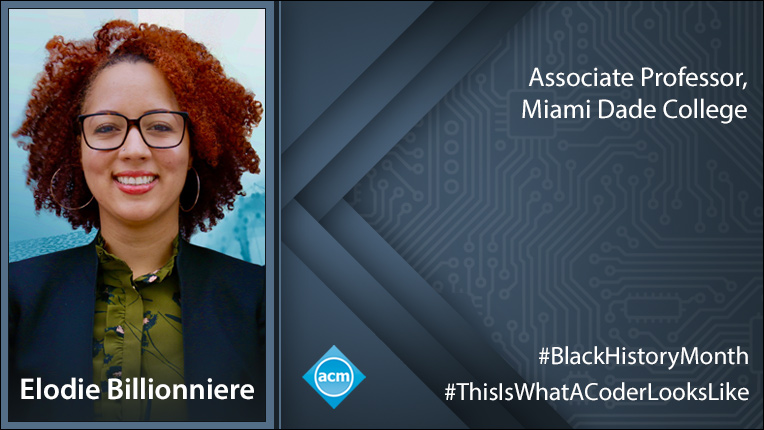
Q. What inspired you to pursue computing as a profession?
A: Early in my childhood, I was intrigued with numbers and enjoyed solving puzzles. With that in mind, I started out as a math major with an interest in the actuarial profession until one of my girlfriends asked me to take the introductory Java programming course with her so she would not feel alone. Since I had not taken any elective courses yet, I went along with her and ended up enjoying the exploration of computational thinking in various contexts. Hence, the following semester, I changed my major to computer science-mathematical sciences and took additional computing courses. Although the following year, my friend changed her major to management information system after struggling with the data structure course, I persisted and continued on as a computer science major in graduate school.
Q. Were there any Black computing leaders who inspired you early on in your life or career?
A: Prior to graduate school, I did not know of any African American computing leaders, but also I was not searching for them. In graduate school, I was a MGE@MSA AGEP scholar and through this NSF-funded scholarship program I had the opportunity to attend conferences such as the Institute on Teaching and Mentoring, ACM Richard Tapia Celebration of Diversity in Computing, and Grace Hopper Celebration where I finally got exposure to many underrepresented minority groups in the computing field including Black computing leaders. From these national meetings, I was able to network with my peers and to have access to mentorship from scholars who look just like me and have similar experiences.
Q. What impact has the underrepresentation of Black people in computing had on your career? Have you had to navigate specific challenges or biases related to this?
A: From my educational journey, I had already been acclimated to an environment where I was always one of the very few, if not the only one, in my computing courses. The adversities associated with discomfort, biases, and loneliness felt at first, were put aside to work harder and create opportunities for others so they will not experience the same types of adversity.
Q. What advice would you give to Black students entering the computing profession?
A: Confidence is key as people may try to down play your efforts and ideas and sometimes try to take away your shine. Also, a support network is essential to navigate through the profession. Last but not least, take advantage of each opportunity presented as you never know which door will lead you toward your desired goals and dreams.
Q. How would you suggest organizations foster an environment where young people from all backgrounds know their ideas and contributions are valued?
A: If the intent is genuine then organizations should consider using their (social) platform to empower young people from all backgrounds to drive the conversation by voicing their thoughts and sharing their experiences.
Q. Where would you like to see improvements within the computing community when it comes to inclusivity?
A: I would like to see more opportunities for professional development in leadership and see more diversity in the computing faces so it is not the same diversity faces and leaders we see each year. It seems there are barriers to attain leadership roles as only few are selected for these roles.
M. Brian Blake
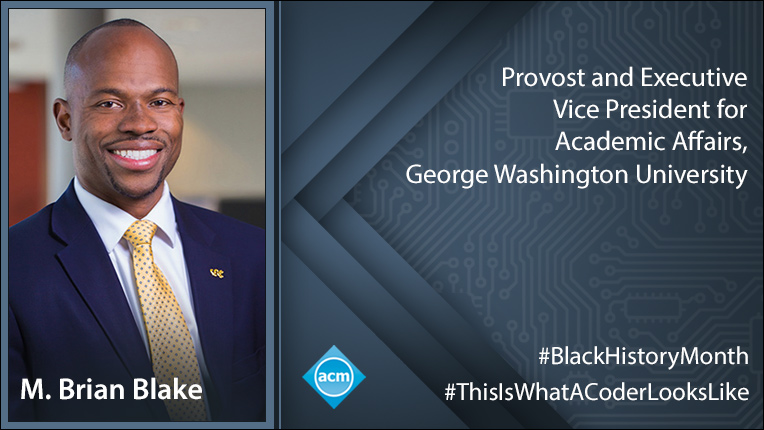
Q: What inspired you to pursue computing as a profession?
A: I am a unique case. I started programming in 4th grade on an Apple IIe computer that my father bought for his service station business. It was collecting dust in our family room so I started to experiment with it. Back then, there were no disk drives, CDs, or flash drives, there were cassette tapes or you would basically transcribe programs from magazines. I typed many computer programs from a magazine that my parents purchased for me. Along the way, I learned how to understand programs and also how to debug based on typos that I inadvertently introduced. By 5th grade, I knew that I wanted to be a computing professional and later attended Georgia Tech in EE/CS. I later participated in a list of programs to support up-and-coming engineers and computer scientist and some programs geared toward African-Americans or Underrepresented minorities more broadly.
Q: Were there any Black computing leaders who inspired you early on in your life or career?
A: Early in my education (i.e. high school), there were no real African-American role models. I went to a private Catholic high school (Benedictine Military School) and an early teacher was Father Anthony who encouraged me to take 4 years of computing courses in computer graphics, simulation, Basic language, and PASCAL language. As an undergraduate, a later role model was Professor Gary May, an African-American electrical engineering professor, Georgia Tech. He used computing techniques for semiconductor manufacturing. He is now Chancellor at UC-Davis, so he role modeled me as a computer professional and now as an academic administrator. Later, Professors Valerie Taylor, Bryant York, Roscoe Giles, and the late Skip Ellis collectively mentored and role-modeled my entire generation of computer science professors.
Q: What advice would you give to Black students entering the computing profession?
A: Although the field is not accustomed to African-American computer scientists, I personally have found individuals in the field to be open to mentorship. Although the systems might feel a bit isolated for young computing professional who often will be the only one of their demographic in a group, I have found that establishing a broad set of mentors from all background to be extremely helpful. Although initially by necessity, I had excellent mentors from all background although later I found established senior African-American role models.
Julian Brinkley
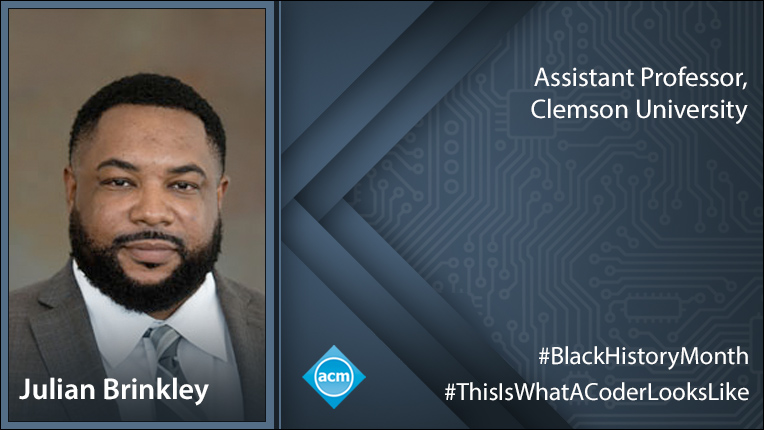
Q: What inspired you to pursue computing as a profession?
A: I consider myself to be a bit of a futurist, growing up reading the works of future-focused authors like Arthur C. Clarke and Isaac Asimov. I would say reading the fictional works of these authors, which in many ways are grounded in science, put me on the path that I continue to travel today. I was also fortunate to grow up in a household that encouraged creativity and intellectual pursuits. Both of my parents were instrumental in cultivating my passion for creativity and technology, and they helped me to channel this into scientific endeavors. Computing just happened to be what I naturally gravitated towards.
Q: Were there any African American computing leaders who inspired you early on in your life or career?
A: Unfortunately, I was not introduced to the concept of African Americans in computing until graduate school. My hope is that with the efforts of initiatives to broaden participation in STEM fields that this becomes less of an issue for those interested in computing. That stated, growing up I gravitated towards African American scientists and inventors like George Washington Carver and drew considerable inspiration from their stories.
Q: What impact has the underrepresentation of African Americans in computing had on your career? Have you had to navigate specific challenges or biases related to this?
A: This is a really interesting question for me as I feel like the answer to the question would change depending upon when it was asked. I have spent a significant part of my adult life in industry prior to transitioning into academia. As a software developer who often worked in or with distributed teams, the underrepresentation of African Americans was not something that was glaringly apparent in many circumstances; I was fortunate in many cases to work on diverse teams. Given that I spent much of this time working remotely with clients located around the globe, ethnicity just didn’t seem to be a significant factor. The clients that I worked with were primarily concerned with my ability to satisfy a given technology-related business need. I would say that the underrepresentation of African Americans became more of an issue for me when I returned to graduate school and observed the very limited number of students of color who were similarly pursuing a graduate degree in computing. I actually felt more isolated in many respects during much of this period than I did when I was physically isolated while working remotely. I think the biggest challenge that I faced from this was overcoming my own concerns about my ability to successfully complete an advanced degree in a discipline where only a small number of those who had done so previously looked like me.
Q: What advice would you give to Black students entering the computing profession?
A: I would say that computing is inherently based on what you know. My advice to anyone entering the profession is to literally treat it like a craft; work on your craft consistently and diligently and become as skilled as possible. You should strive to become so skilled that your talent cannot be denied or ignored.
Q: How would you suggest organizations foster an environment where young people from all backgrounds know their ideas and contributions are valued?
A: I think the answer to this question is much simpler than it is often made to seem. I think if organizations want to communicate that they value diversity, they need to do everything possible to truly be more diverse. Talking about diversity is easy; the challenge is demonstrating your values through actions like diversifying your workforce or organization.
Q: Where would you like to see improvements within the computing community when it comes to inclusivity?
A: There are obviously many areas of need but as a tenure-track faculty member I think we need more inclusion and diversity in the professoriate. In interacting with undergraduate students there is often a perception that pursuing an advanced degree is not necessarily attainable for minorities. I think to a great degree much of that sentiment comes from the lack of diversity in many computer science departments. If students are not seeing examples of tenure track faculty who have successfully navigated the challenges of graduate school to earn degrees leading to faculty positions, it creates an impression that a graduate degree in computing is an unattainable goal. At Clemson we are developing an organization called the International Society of Blacks in Computing (ISBIC) to actively work towards increasing the number of underrepresented minorities in the computing discipline with a focus on developing and supporting the minority faculty members of the future.
Q: How can computing technologies be leveraged to eliminate systemic racism?
A: My parents are big fans of Star Trek. My mother often suggests that the world will be a better place when society is more like what we see on that show; entities caring for one another regardless of race, gender, or even species. I think computing technologies of all kinds, properly conceived, fairly implemented, and equitably distributed, can lead us towards the type of near-utopia that we see in shows like Star Trek. When everyone prospers and is able to leverage the power of technology, I think race may simply become less of a differentiating factor.
Diana L. Burley
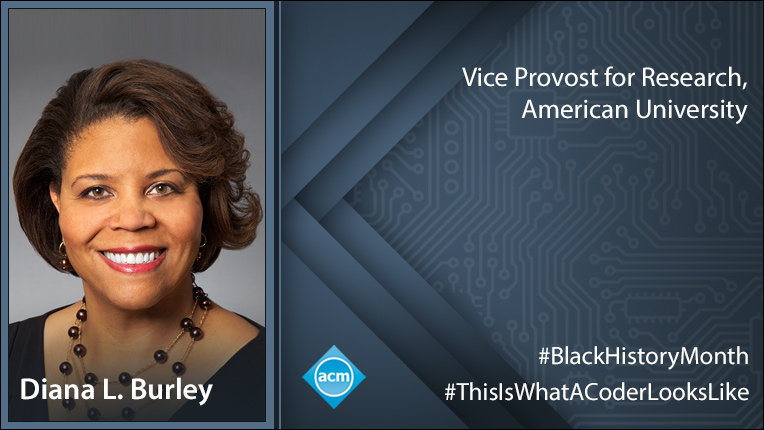
Q: What inspired you to pursue computing as a profession?
A: I wanted to have a voice in shaping the future of society. Advances in computing are driving that future and I had an unwavering desire to ensure that the technology was reflective of the diversity in our society. That passion still energizes me every day.
Q: Were there any Black computing leaders who inspired you early on in your life or career?
A: While not early in my career, I am inspired by Kimberly Bryant, the Founder and CEO of Black Girls CODE. I appreciate her trailblazing efforts to bring black and brown girls into the computing field and to give them the freedom to design their own futures.
Q: What impact has the underrepresentation of Black people in computing had on your career? Have you had to navigate specific challenges or biases related to this?
A: Absolutely. I face challenges every day. I do not allow myself to dwell on them. Instead, I work harder and let my work and my work ethic speak for itself.
Q: What advice would you give to Black students entering the computing profession?
A: I encourage students to take advantage of every opportunity to expand their knowledge of the breadth of computing disciplines, to explore how other areas of interest might intersect with the field, and to view every experience as a learning experience.
Q: How would you suggest organizations foster an environment where young people from all backgrounds know their ideas and contributions are valued?
A: Diverse and inclusive environments have role models at every level of the organization. Organizations must be introspective and actively work to remove bias and inequities (sometimes hidden, sometimes not) present in their environments. Healing begins at home.
Q: How can computing technologies be leveraged to eliminate systemic racism?
A: Rather than focusing on emerging technology itself, I suggest that we focus on how the field of computing can eliminate systemic racism. By promoting equity throughout the design, development and implementation processes, we can leverage the promise of computing technology to advance social justice.
Q: Where would you like to see improvements within the computing community when it comes to inclusivity?
A: Given the current and future role of computing in society, diversifying the field is a moral imperative. In many ways the global pandemic has accelerated this imperative by amplifying designs that cause usability gaps and disparities in access to computing resources.
The impact of these computing inequities on the most vulnerable of our society cannot be overstated as they are tightly coupled with access work, education, healthcare – critical services that have largely moved online in the last year.
As computing professionals, we have a responsibility to facilitate systemic change by promoting equity in our policies and procedures, investing in initiatives that diversify our community, and expanding partnerships that broaden participation and build inclusive environments. The work of diversity must not be borne solely by Black computing professionals. This is the work of all of us. Computing is the foundation of 21st century society. As such, the design, development and implementation of computing resources must reflect the collective insights of the full range of societal members.
Chris Crawford
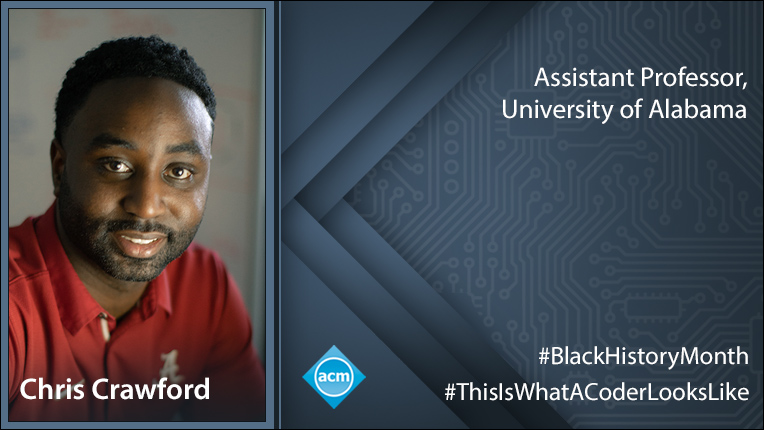
Q: What inspired you to pursue computing as a profession?
A: At the age of 13, my aunt gave me my first computer. Soon after I received the machine, it stopped loading. Knowing my parents did not have the funds to repair it or buy a new computer, I became determined to fix it myself. After spending hours learning how to use various MS-DOS commands, I successfully reformatted the hard drive and installed a new operating system. Thus began my journey in the world of computer science.
Q: Were there any Black computing leaders who inspired you early on in your life or career?
A: While attending the University of Alabama, I was inspired by Dr. Monica Anderson, who recruited me to work in her robotics research lab as an undergraduate researcher. During graduate school, I studied under Dr. Juan Gilbert, who also inspired me to pursue a career in Computer Science.
Q: What advice would you give to Black students entering the computing profession?
A: I encourage Black students to gain experience working on interdisciplinary projects. As the landscape of computing shifts, gaining interdisciplinary skills will become increasingly important. I would also encourage students to spend a significant amount of time sharpening their technical skills early in their careers.
Shaundra B. Daily
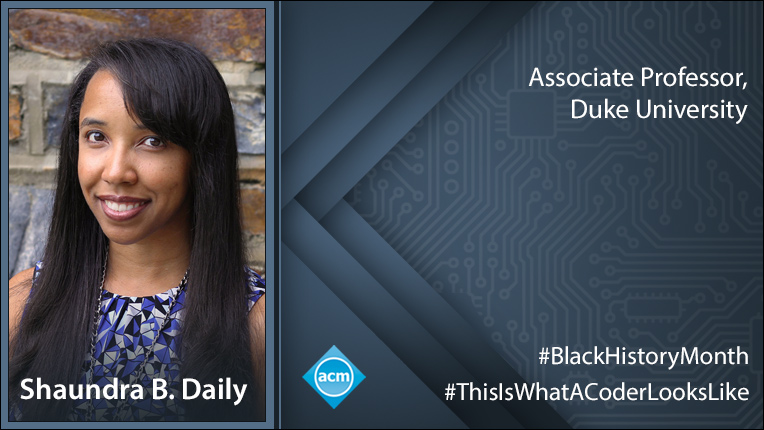
Q: What inspired you to pursue computing as a profession?
A: I actually didn’t have computing on my radar. I went into engineering with the intention of pursuing criminology, and found a passion for imagining, designing and building technologies for education. Now, as a professor and business owner, I am beyond excited to utilize the skills I’ve learned to create technologies that can improve the social, emotional, and physical lives of diverse communities.
Q: What advice would you give to Black students entering the computing profession?
A: The core of who you are shouldn’t be hidden or assimilated. What you bring to the table is uniquely you. No one else can accomplish what you can.
Joshua Ekandem
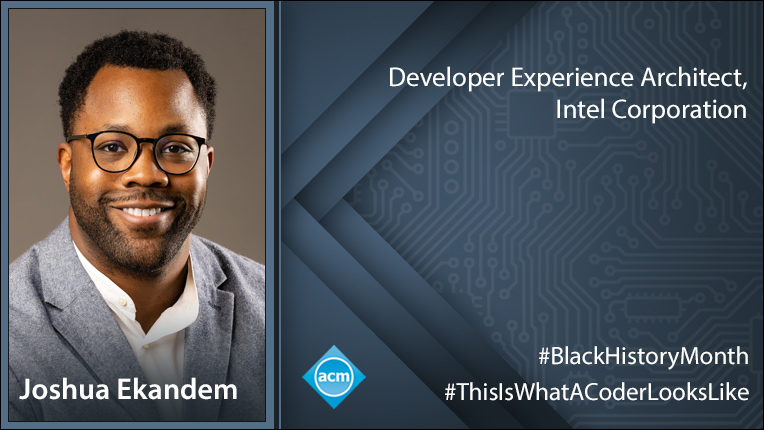
Q: What inspired you to pursue computing as a profession?
A: I’ve always been a tech geek, and one of the many inspirational moments that got me closer to the computing profession was the release of the iPhone in 2006. The iPhone served as an example of how multiple technologies could be cleverly combined to meet a number of user needs. Combining a phone, camera, and the functions of a PDA, all in one easy to use (and easy to carry) device was brilliant, and this started my journey towards interface design! However, it took a bit longer for me to the connect the dots to computing as a profession. In 2008, I started working with a friend who was a Computer Science major exploring novel interactions on a touch-table project. He introduced me to the Human Centered Computing Lab at Auburn University, and the rest is history.
Q: How would you suggest organizations foster an environment where young people from all backgrounds know their ideas and contributions are valued?
A: For organizations to really foster an environment of inclusion I think it’s important that they encourage people to bring their true authentic selves to work. If an organization has made an honest commitment to foster a culture of inclusion, they will have clear actions that amplify the voices of those not in the majority. As a pre-requisite these organizations will have safe spaces and platforms for people to share their perspectives, and reward those that bring those unique ideas. I think when young people see this from an organization they’ll know that that organization will truly value their contributions, and is not merely lip-service.
Q: How can computing technologies be leveraged to eliminate systemic racism?
A: I believe requiring greater transparency and accessibility around technology is a good start. Is it clear to those impacted by the technology, “Who’s not in the room when the technology is designed?”, “How was the technology tested, and with whom was it tested?”. Technology is a tool that can be used to build bridges of unity, or bombs of separation. Ensuring we have more transparent and easily accessible information around how the technology is designed, implemented, and its impact to communities of color is important.
Pamela Gibbs
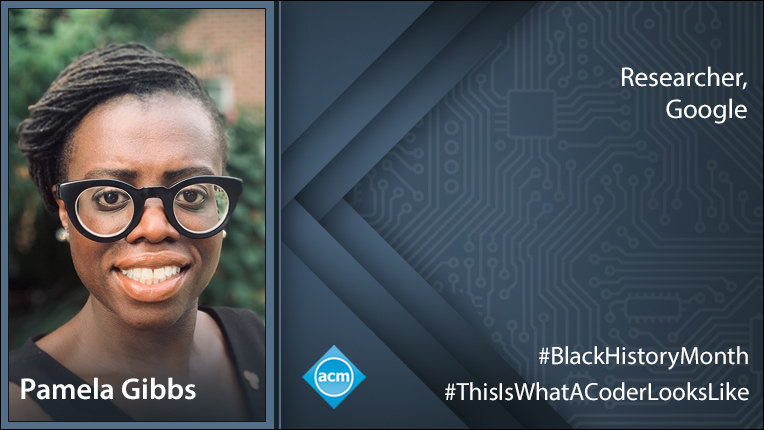
Q: What inspired you to pursue computing as a profession?
A: I have always been fascinated by technology. Ever since I was a child. I loved the way it had the power to transform even the most mundane to something interesting. I loved how it reduced barriers of access, while increasing efficiency. However, I was not exposed to persons that looked like me, so I dismissed the idea that I could ever be a technologist. Even in college, when I took my first C++ class, despite doing well in it, and having an interest, I was discouraged from pursuing anything further. So I did what a lot of people do, and assumed it was not for me. It was not until my children came along, that my desire to give it another try re-emerged. At that point I was looking to change careers, and knew that technology was going to play an even bigger role in the advancement of society. So I had two options, go for it or don’t. I chose the former.
Q: Were there any Black computing leaders who inspired you early on in your life or career?
A: There were none. Unfortunately, I was not aware of the incredible names I now know. And honestly that is heartbreaking. The fact that the contributions made by Black technologists still remain relatively unknown is terrible. Because the image of a technologist has been presented in one way for so long...it becomes "reality" which has real world implications of who is acceptable, and who gets access. Anything that is different from that image, even if it does exist, which I now know it does and I also embody, is not something that people readily ascribe to or accept. I am a firm believer that you can not be what you can not see....or at the very least it makes it very difficult. So many children believe that they are not capable or STEM related careers are for a specific type of person, because they do not see themselves reflected in these spaces. However, technological advancements, specifically the internet has brought more light to the countless innovators and technologists who would have otherwise gone unknown. I have met some of these incredible people along my journey - roboticists, data scientists, software engineers, founders...all doing things that will literally shape technology going forward. This has even played out in my own life with my children. Because they see mommy as a technologist and I intentionally expose them to others that bear their reflection, they have expressed interest in technology as well. My oldest, 17 is fascinated with robotics and biotech. She is a part of her robotics team at school, and is currently taking AP level math and science courses. My youngest, age 6...well according to him, he created the universe, will build me a rocket master blaster to take me around the galaxy, and will have his own company as soon as he gets his own laptop.
Q: What impact has the underrepresentation of Black people in computing had on your career? Have you had to navigate specific challenges or biases related to this?
A: The biases are all around you. The very nature of being black. Of being a woman. And of being a black woman...each of these have distinct implications on how the world perceives and treats you. You are not only underrepresented, you are underestimated, and many times unwelcome. That’s the reality. I don't believe in sugar-coating. You can either accept it or you drown out the noise and bet on yourself. It’s not easy. In fact there were many days that I questioned if I was making the right choice. However, I had to ask myself what exactly do I want my legacy to be? The thing with technology is that it literally is shaping lives. It has transformed the way we eat, communicate, work, live and consume services. I had to ask myself, do I want to sit out, and allow others to shape these technologies which often exclude those that look like me from the decision making and design process due to lack of diversity, or do I want to be in the room and help shape them. And for me, the answer was crystal clear. Besides, as a child I had a very hard time following scripts I was given, so why start now.
Q: What advice would you give to Black students entering the computing profession?
A: Bet on yourself - ALWAYS. Even when you make mistakes. Even when you have no idea what you are doing. Even when you feel like the journey ahead is too long, and too hard. I have found that persistence, the willingness to ask for help, willingness to learn, and being open minded have been the key to my success. Recognize that the opportunities where the most learning occurs isn't always the most pleasant, especially when it stretches you. Oftentimes it happens in failure. And even though there is a ridiculous notion that failure isn't an option (I used to ascribe to this myself) - I know it's ridiculous because I have failed more than I have succeeded, because each failure I have experienced made way for bigger successes I have achieved. The secret there is simple... when you fail, you learn to pivot, you learn to adapt, you learn to strategize, and you learn what not to do. Just make sure you are failing forward and not backward. Last but not least, is the combination of creating a supportive community of mentors, peers, and friends to help you navigate and be authentic to who you are. This is key. And remember everything comes in due time. Empires were not built in a day. It will come. And you will do it. Trust me.
Q: How would you suggest organizations foster an environment where young people from all backgrounds know their ideas and contributions are valued?
A: Giving young people opportunities to share their experiences and having their voices heard is a start. I would also say, giving space for these young diverse bodies not only speak but play a role in how decisions and programming are designed and implemented are equally as important. Taking in feedback is great, but action needs to follow in order for this to be truly of value.
Q: Where would you like to see improvements within the computing community when it comes to inclusivity?
A: Simply put, the technology that powers the world should have those that are building and managing it, mirroring the society that uses it. There should be equal access to hiring, pay, and representation.
Q: How can computing technologies be leveraged to eliminate systemic racism?
A: Again, this comes back to having diversity in all rooms, especially where decisions are made and ensuring that these persons play an active role in shaping the decisions and designs that are implemented. It's really that simple.
Juan Gilbert
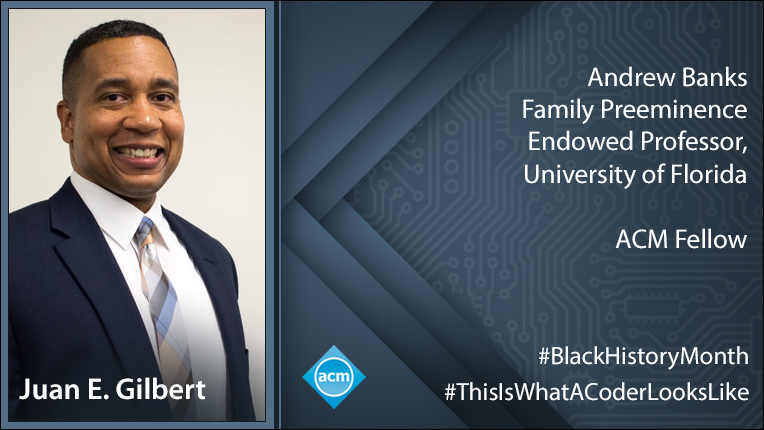
Q: What inspired you to pursue computing as a profession?
A: As a kid, I loved science. I really wanted to be a scientist. I was the first in my family to go to college, so I didn’t have very much guidance. I entered college as a chemistry major. I took advanced chemistry as a freshman and one day a senior chemistry major told me that I was good at chemistry, I would do well in the program and when I graduated I would go to graduate school. I said, “Go where? graduate school? You mean I have to go to school again?” Again, I was the first in my family to go to college, so I didn’t know anything about graduate school. I thought you went to college so you could get a job. So, I changed my major to systems analysis or computer science because I had taken a programming course and I enjoyed it, plus I knew a senior who was graduating and got a job. So, I didn’t directly pursue computing as a profession all along. It just happened along the way.
Q: Were there any Black computing leaders who inspired you early on in your life or career?
A: None. I didn’t meet an African-American in computing with a PhD until I was near the end of my PhD. There were so few of us at that time. I was isolated and thought I was the only one for years.
Q: What impact has the underrepresentation of Black people in computing had on your career? Have you had to navigate specific challenges or biases related to this?
A: This has an impact on all of us, but I didn’t let that stop me. I decided that I was going to do something about it. So, when I became a professor, I said I would recruit more African-Americans, Hispanics and other underrepresented students into my lab and into the field.
Q: What advice would you give to Black students entering the computing profession?
A: If you are isolated, don’t let that stop you. This is an exciting field with the potential for high reward and high impact. You can find others. You can start by reaching out to myself and others. Feel free to contact me at [email protected] and I will be happy to connect you into communities of scholars from underrepresented backgrounds.
Q: How would you suggest organizations foster an environment where young people from all backgrounds know their ideas and contributions are valued?
A: You start by telling your members that this is important to you and that you are willing to learn about their ideas, issues, etc. This all starts with a conversation and understanding that people have differences and that’s what makes them special and will make your organization stronger.
Q: Where would you like to see improvements within the computing community when it comes to inclusivity?
A: I think we could do a better job in leadership, specifically, conference program committees and other boards. The leadership needs to be inclusive and diverse to attract others.
Q: How can computing technologies be leveraged to eliminate systemic racism?
A: This requires innovative thought and expertise in computing and it can be done. For example, we have leveraged AI to create holistic diversity in admissions. This AI is called Applications Quest, http://www.ApplicationsQuest.com. We have also proposed the Virtual Traffic Stop, http://www.VirtualTrafficStop.com to reduce tensions during routine traffic stops. This can be done, but we have to be innovative in the design, implementation and evaluation of these technologies. I am happy to help anyone that is interested in this area of research and development.
Kinnis Gosha
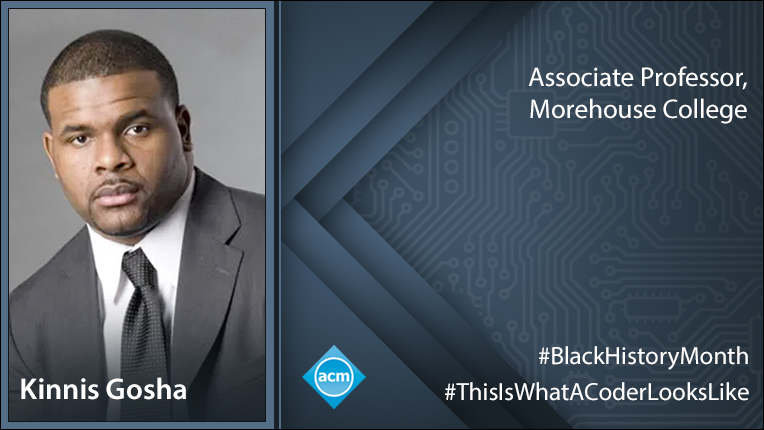
Q: What inspired you to pursue computing as a profession?
A: I enjoy the opportunities that computing has provided for me and my family.
Q: Were there any Black computing leaders who inspired you early on in your life or career?
A: The GOAT [Greatest Of All Time], Dr. Juan E. Gilbert.
Q: What impact has the underrepresentation of Black people in computing had on your career?
A: I think the lack of diversity in computing has opened some doors for my students and provided them some special opportunities to build capacity in my department.
Q: What advice would you give to Black students entering the computing profession?
A: You get out what you put into it. Respect in this field is earned. Hard work and long nights are required.
Siobahn Day Grady
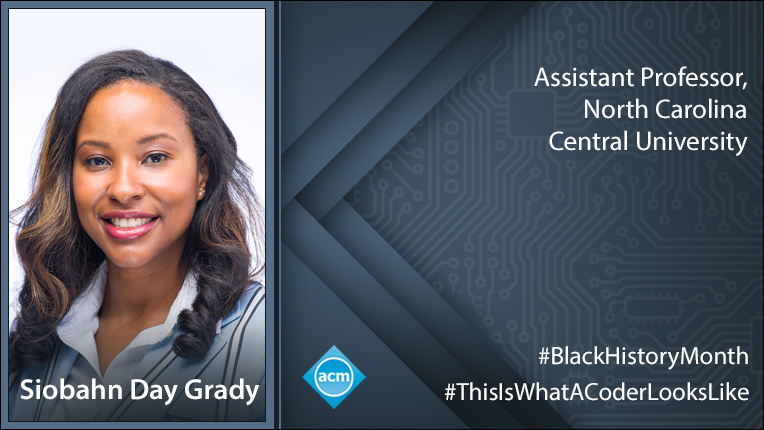
Q: What inspired you to pursue computing as a profession?
A: My parents inspired me to pursue a computing profession. My father is a computer programmer, and my mother was a specialist at one of the world's largest computing companies. As an only child, I loved puzzles and video games. With technology in my home, I soon went from the video game console to play games on the computer. That rapidly evolved into building websites and learning how to code.
Q: Were there any Black computing leaders who inspired you early on in your life or career?
A: Aside from my parents, black leaders who inspired me early on were Dr. Elva J. Jones and Dr. Rebecca Caldwell at Winston-Salem State University. That was the first time I had women who looked like me teach me computing and nurture my passion for computing.
Q: What impact has the underrepresentation of Black people in computing had on your career? Have you had to navigate specific challenges or biases related to this?
A: There is an impact felt as a black woman in computing. Many times I may be an "only" in the room. The only black woman or black computing profession. These experiences often feel isolating. I have experienced challenges in my career related to underrepresentation and biases. As a result, I choose to change minds not with words but through actions. The work I do will speak for itself and create pathways for others along the way.
Q: What advice would you give to Black students of color entering the computing profession?
A: I would tell young students of color to believe in themselves. Make sure you do your research and have a support system. Knowing what this field entails will help you identify areas of growth and opportunities to shine. Remember, you have what it takes to succeed. Apply yourself, work hard, and you will reach new heights. You will also need others' support on your journey, such as mentors, family, friends, etc.
Q: How would you suggest organizations foster an environment where young people from all backgrounds know their ideas and contributions are valued?
A: Organizations should treat others in the same manner they expect others to address them. People need to know that you view them as valuable. We must never think too highly of ourselves and be open to other perspectives. There is always something to learn from everyone.
Q: Where would you like to see improvements within the computing community when it comes to inclusivity?
A: The computing community needs improvements in providing mentorship opportunities at every level (e.g., academic, industry, leadership, service roles, etc.). Often minorities are left to figure things out on their own without any mentorship. Mentors offer insightful guidance and also recommend mentees for opportunities as they become available.
Jason M. Grant
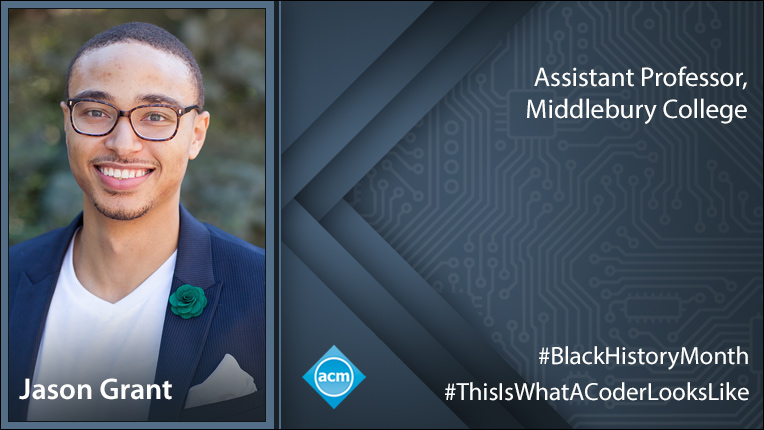
Q: What inspired you to pursue computing as a profession?
A: A lot of my inspiration to pursue a career in computing came from my dad. He worked in information technology for most of his life, and often had several computers at home for remote work and testing. Whereas some kids grew up with a television in their bedroom, I had a computer. This is commonplace now, especially with the advent of laptops, tablets, and smartphones, but was not so common in the 90s. I spent a significant amount of time shadowing my father in his workplace, and we frequently visited computer trade shows. My mom was instrumental in helping me secure my first job working for a technical support office during my high school summers. I learned so much from those experiences that I decided to major in computer engineering as an undergraduate, and I have been pursuing a career in computing since then.
Q: Were there any African American computing leaders who inspired you early on in your life or career?
A: Yes. In 2006, I spent the summer at the University of Colorado, Boulder and completed my first research experience in the SMART program. To my surprise, I learned that my research mentor, the late Clarence “Skip” Ellis, was the first African-American to earn his PhD in computer science and the first African-American to be elected as a Fellow to the ACM. For an individual with so many accolades, he was incredibly generous with his time and resources. Working with him that summer was transformational. The first Black computer science or engineering professor I had as a student was Dr. Janet Rutledge, who is the Vice-Provost and Dean of the Graduate School at UMBC. She was in the administration, still teaching part time, and sometimes brought her son to class when she taught nights. I think she tucked her cape into her dress clothes. She was a great professor and mentor. Similarly, when I was a student at Notre Dame, Dr. M. Brian Blake, who was then an associate dean in the engineering department, was a close mentor and friend. He often told me I would go into academia long before I knew it myself!
Q: What advice would you give to young students of color entering the computing profession?
A: The computing and tech industry as a whole needs more responsible, ethical, and morally sound professionals. It's hard to tell a soon-to-be graduate to be selective in the places that they work, as it is already difficult finding employment in this pandemic; however, I would challenge those entering the industry to find a company or team that aligns with their morals and values or figure out how to promote change in a company that doesn't. Lastly, find a support network, engage in something that promotes continual learning, and do something fun and relaxing after work or on the weekends to avoid burnout.
D. Fox Harrell
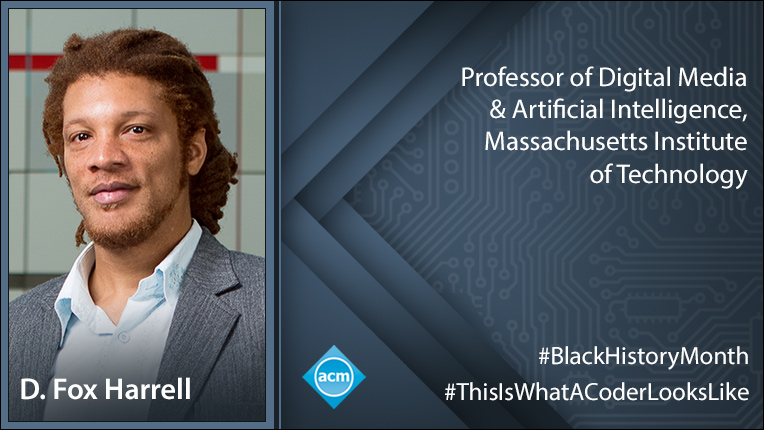
Q: What inspired you to pursue computing as a profession?
A: I can answer this question with the following text, adapted from the preface of my book, Phantasmal Media: An Approach to Imagination, Computation, and Expression (MIT Press, 2013). It starts with an idea I had as a child: Television, everyone said, was already compromised—it rotted minds and turned people into couch potatoes. So I wondered if there would be any way that I could help whatever medium came next to play a more ethical role in society. I cannot say that this book lives up to the dream that musing sparked. Yet this book might be considered a step in pursuing a more mature vision rooted in that early dream, with its dual aims of helping people see the unconscious forces that shape media images and helping them use computing—in some ways the next media after television, one could say—to affect society for the better.
As a teenager, I learned of college majors such as “logic and computation,” “symbolic systems,” and “cognitive science.” How wonderful it sounded to combine computer science with fields such as philosophy, mathematics, and psychology. Those majors also all involved artificial intelligence (AI). What a dangerous-sounding area of study—all wrapped up in the aesthetic sensibility of a computer game I loved called Neuromancer (based on the William Gibson novel). By earning a hybrid computer science/mathematics/philosophy [Bachelor of Science] degree at the same time as a degree in art [Bachelor of Fine Arts] (which included learning to work with images, text, sound, video, computer-based media, and more), I would not have to leave any of my educational interests behind. … I later came to realize a flaw of my childhood dream: the medium alone is not what is ethical or unethical. Computing, which has indeed now become a medium after television, is connected to a complex web of previous media, culture, behavior, preexisting power relationships, and more. Nonetheless, computer science and the other fields I have studied have enabled me to follow my dream of inventing new media with the aim of bettering the human condition. That path would eventually lead me from Carnegie Mellon as an undergrad to NYU’s Tisch School of the Arts for my Master’s degree, UCSD’s Computer Science and Engineering department for my PhD, and to MIT’s Computer Science and Artificial Intelligence Laboratory (CSAIL), where I am now Professor of Digital Media and Artificial Intelligence.
Q: Were there any African American computing leaders who inspired you early on in your life or career?
A: My father inspired me. He was an educator and avid early adopter of technologies. Since he was a teacher, I had access to a personal computer during summers as a youth. It set me on my path and enabled me to learn to code. By junior high school, taking advantage of the public library, I was able to learn about topics such as symbolic programming, philosophy of AI and mind, how to code, and more.
I did learn many lessons from African American leaders in other fields that I apply to my computing work. From the musician Nina Simone and writer James Baldwin, I learned how art can be a form of pursuing positive social change. From speculative fiction authors Samuel R. Delany and Octavia Butler, I learned how worldbuilding can be a form of social reflection; and from Amos Tutuola I learned that these worlds we build can challenge the rules imposed by unfair social hierarchies. From the composer Charles Mingus I learned how to think about how top-down structure relates to bottom-up interaction (in his case improvising musicians, in my case users of computing systems). From the artists Adrian Piper and David Hammons I learned that cultural production can be an intellectual, conceptual act that can be evocative and poetic at the same time. When I work in areas such as AI-driven interactive narrative or virtual/augmented/mixed reality I take all of these lessons I’ve learned to heart.
Q: What impact has the underrepresentation of Black people in computing had on your career? Have you had to navigate specific challenges or biases related to this? What advice would you give to Black students entering the computing profession?
A: Sometimes my research was grounded in a valued different perspective than others in my field. Other times it meant that the topics I care about deeply were undervalued. For instance, I have been in some venues where HCI work addressing social inequality has been seen as a marginal topic, of interest only to various underrepresented groups – in contrast to novel technical interface features that were celebrated. However, in other venues, the new interface feature might seem like an incremental advance, whereas novel ways of modeling of social issues of oppression may seem centrally important to the human condition. Ultimately, the important point here is that multiple types of work are valuable and we should be able to appreciate, and even integrate, research from diverse perspectives with an aim of producing innovative results.
Back when I was a student I faced some challenges too. At times, some faculty, staff, and students had a deficit model of my abilities. That is, they assumed I would be a poor student until I proved that I was a top student. For instance, when I once proactively asked an advisor about resources such as additional documentation of particular platform I was told “we don’t have remedial resources at this university.” In fact, the platform we were using was new and I was being proactive – looking to get started on the project early. It was often difficult at the beginning of courses to find groups for projects (pursuing an additional degree in Art also probably fueled some stereotypes) – but by the end of the course the same students who excluded me asked me for help on their problem sets and understanding course concepts. It was frustrating because that process would repeat itself at the start of the next term with new classmates.
In terms of advice I suggest the following. Ultimately, I think that every student should look at their own background as a positive resource for their computing (and other work). Our life experiences, not limited to race/ethnicity, can provide powerful insights in how to be learners and doers in ways that can transform our societies and world.
Q: How would you suggest organizations foster an environment where young people from all backgrounds know their ideas and contributions are valued?
A: First, we can affirm people by having images and artifacts in the physical spaces where people work representing an array of backgrounds. Second, we can crucially provide opportunities where technical research can be applied to the issues that people care about (e.g., in diverse communities; when fighting against oppression). Third, even better, we can recognize that technical and scientific work can be grounded in, and benefit from, diverse perspectives. In other words, the broader impact of research can be a part of the scientific inquiry – not just an application or form of outreach. Fourth, we can realize that all technical systems are based in culture and make some of those underlying cultural assumptions explicit rather than implicit. This practice can help us avoid issues such as unfair algorithmic bias and enable innovations that arise by grounding research in unique cultural perspectives that may have been overlooked or excluded in the past. Finally, by working collaboratively and integrating these diverse perspectives, we can go further together than any of us could have alone.
Andrea Johnson
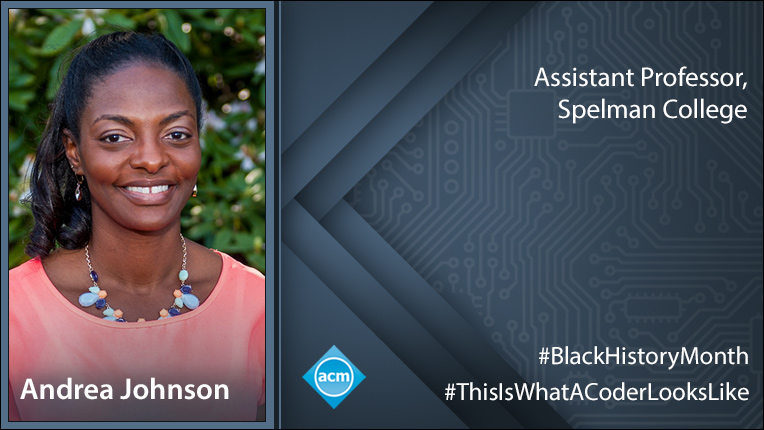
Q: What inspired you to pursue computing as a profession?
A: I always loved tinkering as a kid. If there was something broken or needed putting together, I took on the job. As a child, my father worked in the IT department of a bank and my mother was a secretary but they always encouraged my brother and I to try new things, so it was nothing for me to imagine taking on computing. At some point, we got a computer and I loved playing the games and puzzles on it. For my senior project in high school, I decided to program a spelling bee game and I think that sealed the deal of what I’d do in college. I never imagined what I could do with Computer Science but the intrigue and challenge over the horizon were enough to lure me into it as a major. After many experiences at Spelman College, meeting Mathematician Dr. Etta Z. Falconer, learning from Dr. Andrea W. Lawrence (first African American to get a Ph.D from Georgia Tech), and working with Dr. Juan E. Gilbert as an REU, it was easy to dream of a future in computing.
Q: Were there any Black computing leaders who inspired you early on in your life or career?
A: Before undergrad, I didn’t know anyone other than my father working in tech. After stepping through Spelman’s doors, I kept meeting them like they were a normal occurrence and not the rare gems they were. People like Bryant York, Juan Gilbert, Andrea Lawrence, Valerie Taylor to name a few, who were firsts in most regards but were humble and open about their journeys and their passion to help others.
Q: What impact has the underrepresentation of Black people in computing had on your career? Have you had to navigate specific challenges or biases related to this?
A: The underrepresentation of Africans Americans has been both a challenge and a blessing. While it has opened doors to new places for me, it has also invited me into isolated, lonely and sometimes hostile territories. It has challenged me to embrace change and difficulties because in turn those things also helped me grow significantly. I learned that I was fearfully and wonderfully made and the only thing that could stop me from achieving the goals set before me was me. You learn to pivot and think creatively when you stop thinking about barriers and focus on opportunities to solve a new challenge.
Q: What advice would you give to Black students entering the computing profession?
A: Figure out your purpose and your passion and set your sights there. Life is hard no matter what road you choose, so choose the one that gives you joy and helps you impact the world around you.
Q: How would you suggest organizations foster an environment where young people from all backgrounds know their ideas and contributions are valued?
A: The best advice I have comes from one of my favorite sayings, “when someone shows you who they are, believe them." If you want young people to believe you’re welcoming and listening, your environment should reflect that; where your organization spends its money and its time are good indicators of what it cares about.
Q: Where would you like to see improvements within the computing community when it comes to inclusivity?
A: I would like to see changes everywhere, classrooms, board rooms, entrepreneurial endeavors, etc. There is always space to invite someone new to the table. If you recognize that the place you reside in is not inclusive, acknowledge it and take action. It is easy to say “that’s how it has always been”, “that will take too long”, or even “that it might be too hard”. Doing the right thing is often hard, otherwise everyone would do it.
Aqueasha M. Martin-Hammond
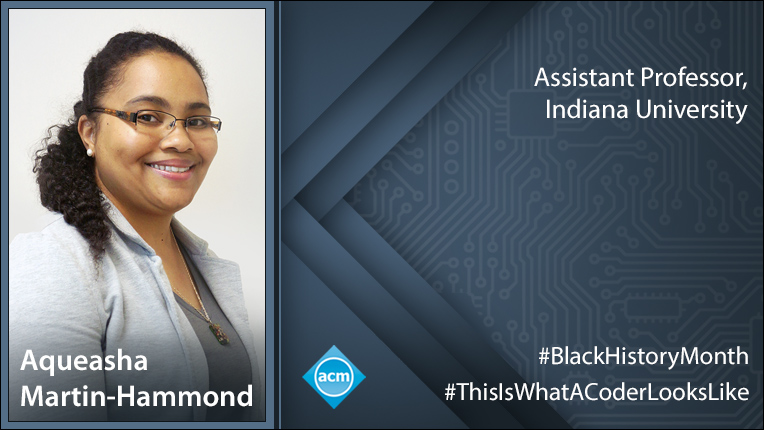
Q: What inspired you to pursue computing as a profession?
A: I did not know about computer science as a potential career path until high school. However, I did really like math and science. I was exposed to computers in elementary and middle school through some of my classes and other experiences and programs. Though not computer scientists, my parents, and other family members were very supportive of my interests and made sure I participated in activities to help me reach my goals. My parents purchased a family computer in high school, and I set it up and spent time tinkering and creating documents for activities and organizations in the community. When it was time to apply for college, I searched for careers that involved all the things I was interested in, and computer science was on the list. At that time, I did not know if I fully understood what a computer science degree would mean for me. However, I saw computing as a way to use my fondness of problem-solving and tinkering to help people and benefit society.
Q: Were there any African American computing leaders who inspired you early on in your life or career?
A: Early on, I was inspired most by people in my family who significantly influenced my journey. The first time I met other African Americans in computing was at Tougaloo College, an HBCU in Mississippi, where I earned my undergraduate degree. Many of my professors in the Math and Computer Science department at Tougaloo were African American. Tougaloo helped to lay the foundation for my career path in computing. When I started college, I had no aspiration to go to graduate school, do research, or go into academia. The faculty at Tougaloo saw my potential and took the time to mentor me, make me aware of, and recommend me for opportunities and programs that provided me with the tools and networks to become involved in research, apply for graduate school, and pursue my current career. During graduate school, I was mentored directly by several African American computing leaders. For example, Juan Gilbert, Cheryl Seals, Jakita Thomas, and Yolanda Rankin helped me in different ways during that time. Since that time, however, I have met and continue to meet many more inspiring African American computing leaders who serve as mentors and advisors.
Q: What impact has the underrepresentation of African Americans in computing had on your career? Have you had to navigate specific challenges or biases related to this?
A: I became aware that fewer African Americans in Computing after I left Tougaloo College. I have and continue to face challenges and biases. I have and still have people that question my presence and my skills and abilities. However, I have been fortunate to benefit from mentors, advisors, and supervisors that have helped at various parts of my career, and I still benefit as a faculty member. I try to use those experiences as motivation and a reminder of one reason I am doing what I am doing.
Q: What advice would you give to Black students entering the computing profession?
A: My advice is to stay focused on your goals, put in the effort to meet them, and persevere. If computing is a profession that interests you, there are so many opportunities out there, and there are people that will support you in your journey. You may face challenges and setbacks, but do not let that drive you away. You belong, and you have unique contributions. Build a good support system of family, mentors, peers, and anyone else in your corner. Continue to learn and grow even beyond the classroom and academics and find ways to move forward so that you can work on the things that excite you.
Q: How would you suggest organizations foster an environment where young people from all backgrounds know their ideas and contributions are valued?
A: Be genuinely open to new ideas and perspectives. Let people know their voices are valued and build an environment that demonstrates you are receptive to listening and learning about different points of view and that you will act when needed.
Q: Where would you like to see improvements within the computing community when it comes to inclusivity?
A: I believe improvements are needed at all levels to bring diverse voices to the table. I honestly believe representation matters, and that inclusivity is essential for addressing the challenges in society. However, unfortunately, I still meet students discouraged because they do not see others like them in a major/career or are told/perceive that they do not belong in the computing field.
Ronald Metoyer
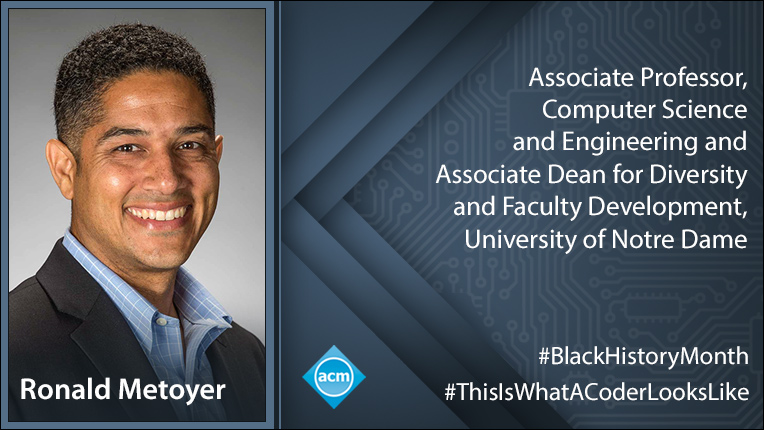
Q: Were there any Black computing leaders who inspired you early on in your life or career?
A: My early career was absolutely inspired and impacted by Prof. Bryant York. Our chance meeting had a tremendous impact on my career.
I had just started my first academic position at Oregon State University. I was informed by my chair that they had also pursued hiring Prof. York, whom I did not know at the time, but they had lost out to Portland State University. That knowledge led me to learn more about him through a Google search.
Fast forward a few months. I was at the Portland International Airport preparing to board a flight to Washington, D.C, when I recognized Prof. York waiting for the same flight. I introduced myself and he immediately took me under his wing. Prof. York managed to get our seats together for the flight and proceeded to mentor me on how to write my NSF CAREER grant proposal. Prof. York's guidance then, during that flight, and during the subsequent weeks was invaluable. I submitted my CAREER proposal and 6 months later was informed that I had been awarded the grant.
Prof. York has been an inspiration and mentor to me my entire CAREER and continues to demonstrate to me the value of a true mentor and advocate. I can only hope to impact the career of another the way he has impacted mine.
Fay Cobb Payton
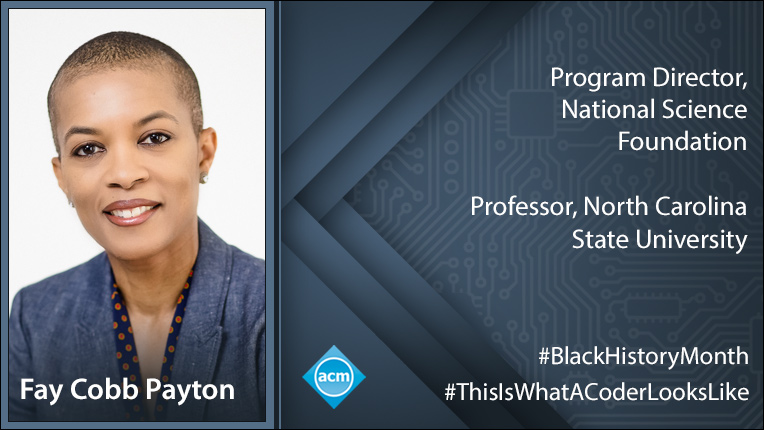
Q: What inspired you to pursue computing as a profession?
A: I studied industrial and systems engineering (ISYE) as an undergraduate student. The curriculum included computer science courses, and the use of applications to solve simulation, optimization, process improvement and statistics problems. It was this coding and the lure of problem solving that inspired me.
Q: Were there any African American computing leaders who inspired you early on in your life or career?
A: My parents (neither of which are “computing leaders”) inspired me. My father is a natural mathematics wizard while my mother is a brilliant linguist. As a high school student, I completed a summer internship at a national lab and observed a number of African American engineers and scientists in action.
Q: What impact has the underrepresentation of African Americans in computing had on your career? Have you had to navigate specific challenges or biases related to this?
A: This had/has a significant impact on my career. There were and continues to be naysayers. Of course, I continue to face challenges and bias – particularly as an African American woman. Much of the research in the space tends to lend itself to grit and resilience of those underrepresented with minimal focus of structural and institutional/organizational barriers. I advise young students to observe leadership and how leaders “lead”. Leaders set the tone and climate on how challenges are resolved or loom; both of which impact career trajectories.
Q: What advice would you give to young students of color entering the computing profession?
A: This depends if they are entering at the point of undergraduate studies or professional careers. In brief, be prepared to work. Much of what we communicate to young students is about the outcome and not the process. I would suggest that students of color understand the process of completing the degree, the rigor needed to complete and be prepared to do the work. This means “yes” having technical aptitude, but you need collaboration, communication and interpersonal skills. I also know that it important to find positive outlets (e.g., peer groups, a hobby, exercise, spirituality).
Q: How would you suggest organizations foster an environment where young people from all backgrounds know their ideas and contributions are valued?
A: Make time to connect, and gain context to understand different backgrounds. I could say much more about this topic. BUT….trust is critical to showing how people are valued. Organizations need to honestly assessment how they lead and who leads. Who and how communicates what is valued.
Q:Where would you like to see improvements within the computing community when it comes to inclusivity?
A: I would like to see improvements in inclusion relative to academic, industry, entrepreneurship and public sector leadership.
Q: How can computing technologies be leveraged to eliminate systemic racism?
A: This requires an inclusion lens in the conceptualization, creation, design, deployment, etc. of computing technologies along with the interpretation of "results" from these technologies. Black and Brown people should be involved, valued, respected and empowered in the initial phrases to address systemic racism.
William H. Robinson
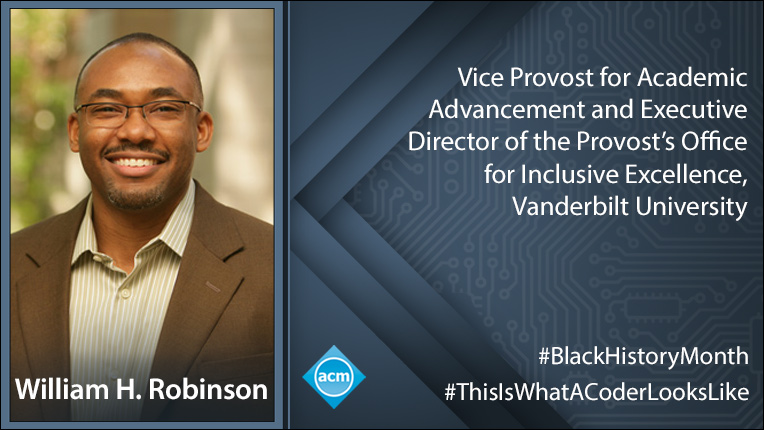
Q: What inspired you to pursue computing as a profession?
A: If I am being honest, then it was likely my Atari 2600!
Q: Were there any Black computing leaders who inspired you early on in your life or career?
A: As an Assistant Professor, I had the opportunity to attend the Academic Career Workshop, where I met Dr. Valerie Taylor and Dr. Bryant York. I benefited from the content of the workshop, such as the mock NSF review panels. But truthfully, I have received the most value from the influence of role models and mentors, such as Dr. Taylor and Dr. York.
Q: What impact has the underrepresentation of Black people in computing had on your career? Have you had to navigate specific challenges or biases related to this?
A: In 2010, I was the first African American faculty member to earn promotion with tenure in the history of Vanderbilt’s School of Engineering, and in 2018 I was the first African American faculty member in the School of Engineering to earn promotion to full professor. My lived experience of being the “first” or the “only one” motivates my work to ensure that am not the last…that others will have access. I began a collaboration with Professor Ebony McGee in Vanderbilt’s Peabody College of Education and Human Development. We co-founded the Explorations in Diversifying Engineering Faculty Initiative (EDEFI) (pronounced “edify”). The mission of EDEFI is to investigate the institutional, technical, social, and cultural factors that affect decision-making, career choices, and career satisfaction for doctoral students, doctoral candidates, postdoctoral researchers, and faculty from engineering and computing who have been marginalized by race and/or gender. Professor McGee and I co-edited a book, Diversifying STEM: Multidisciplinary Perspectives on Race and Gender, which was recognized as a 2020 Choice Outstanding Academic Title. The book addresses the tough issues of how to navigate the fields of science, engineering, and computing when you are part of a non-dominant identity group.
Q: Where would you like to see improvements within the computing community when it comes to inclusivity?
A: I think we need to be intentional about our efforts to create a genuine sense of inclusion and belonging for identities that have been historically marginalized by or excluded from the computing community. In “Marginality and mattering: Key issues in building community,” Schlossberg wrote, “Involvement creates connections between students, faculty, and staff that allow individuals to believe in their own personal worth.” Our leaders must set the tone to ensure that we include other voices and perspectives so that people see themselves as part of the computing community. We must recognize the humanity in each of us and embrace differences with respect.
Valerie E. Taylor
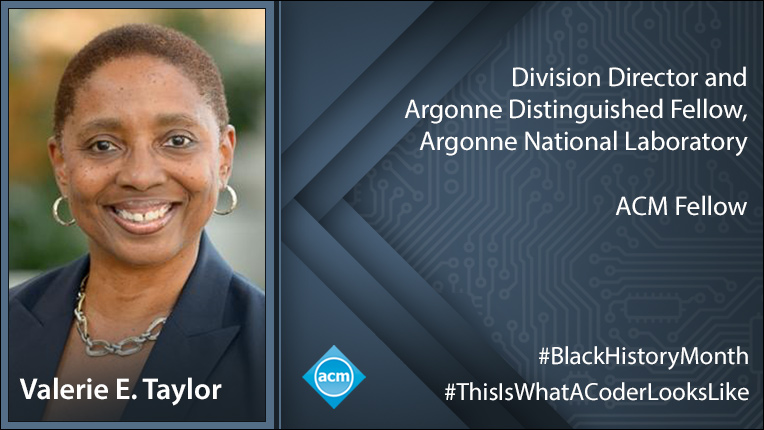
Q: Who or what inspired you to pursue computing as a profession?
A: I was inspired by my Father, Willie Taylor. In 1967, he and four friends started a Black-owned company called Sonicraft, Inc., which designed and manufactured communications equipment. They had contracts with agencies such as the U.S. Air Force, FAA, and AT&T. He was Vice President of Operations. I grew up around soldering irons and circuit boards. In high school, I enrolled in a Fortran programming course and was immediately fascinated about computers. This fascination included through college and for my career. I enjoy my research in high performance computing.
Q: Were there any Black computing leaders who inspired you early on in your life or career?
A: One leader who stands out as serving as an inspiration as well as a mentor is Bryant York. Bryant’s research is in AI, but his experiences include industry, having worked at IBM San Jose Research Labs and DEC’s AI Center; academia, including Northeastern University and Portland State University; and serving as a program manager at NSF. Bryant has been a major advocate for increasing diversity in computing since I have known him, organizing the first NSF Workshop on Minorities in Computing in 1995, co-founding the Institute for African American eCulture in 2000, as well as co-founding the Richard A. Tapia Celebration of Diversity in Computing Conference in 2001. Bryant provided great support and encouragement to bring my full self to my professional career, including my experiences and my passions. To this day, Bryant is a mentor and collaborator on various efforts.
Q: What advice would you give to Black students entering the computing profession?
A: Know that you have so much to contribute to the field of computing, as your knowledge and experiences will significantly impact the field. While the community of Black students and professionals may be small at your institution or company, reach out to a larger community, which is inspirational and supportive. Know that you have a voice that is important to the computing field!